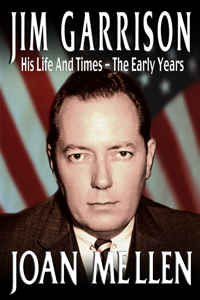
Literary award winning author Joan Mellen has released a new biography of Jim
Garrison, the former District Attorney of Orleans Parish, Louisiana. This colorful account spans from his 1922 birth in Iowa and service in World War II to his years confronting the corrupt politics of Louisiana. This heavily researched book explores Garrison, a civil libertarian and passionate defender of the 1st Amendment, and how he attempted to reform the critical political system of New Orleans in the 1960s, particularly the abuses of B-drinking and other crimes rampant in the French Quarter.
Jim Garrison, called by some "A Tarnished Knight," would become the only public official ever to bring anyone before the bar of justice for the assassination of President John F. Kennedy. Sullivan (1964), and the Dombrowski case, where three New Orleans civil rights activists were arrested for bringing Communist ideas to the movement for racial equality led by Dr. Martin Luther King, Jr. Jim Garrison emerges as a defender of the victims of racial inequality, and of censorship. His actions reveal him to be a supporter of the defendant, and a fierce proponent of the rights of the individual. It also reveals him to have been, in many ways, a man of his generation. This volume takes the reader not to the end of Jim Garrison's life, but to the moment when he declared that "nothing else matters" and devoted himself entirely to his Kennedy investigation.
This is the first biography of Jim Garrison, from cradle to 1966, and it recreates the rich events in his life, including:
- How Jim Garrison was unique in New Orleans for the period for being a staunch opponent of segregation and an advocate of civil rights.
- Why Jim Garrison was sued for criminal defamation by the judges of the Orleans Parish criminal court, the humorous trial, and the trajectory of this case, like the Dombrowski case, to the United States Supreme Court.
- The hilarious chronicle of how Jim Garrison, a reformer, became district attorney as a result of television debates modeled after the Kennedy-Nixon debates.
This volume takes the reader not
to the end of Jim Garrison's life, but to the moment when he declared
that "nothing else matters" and devoted himself entirely
to his Kennedy investigation.
In the process, Garrison
sacrificed a promising political career, a sacrifice he embraced
with no regrets. Like a conventional biography, this book opens on
Garrison's
family history and childhood and takes him through his formative years,
not least his witnessing the atrocities of Dachau concentration camp
at the close of World War Two.
For Garrison, as he said later, this
was a deeply influential moment. It holds an important place in what
would be a life crowded with event. This impressive biography closes
on Garrison in the fullness of his prime.
|
|